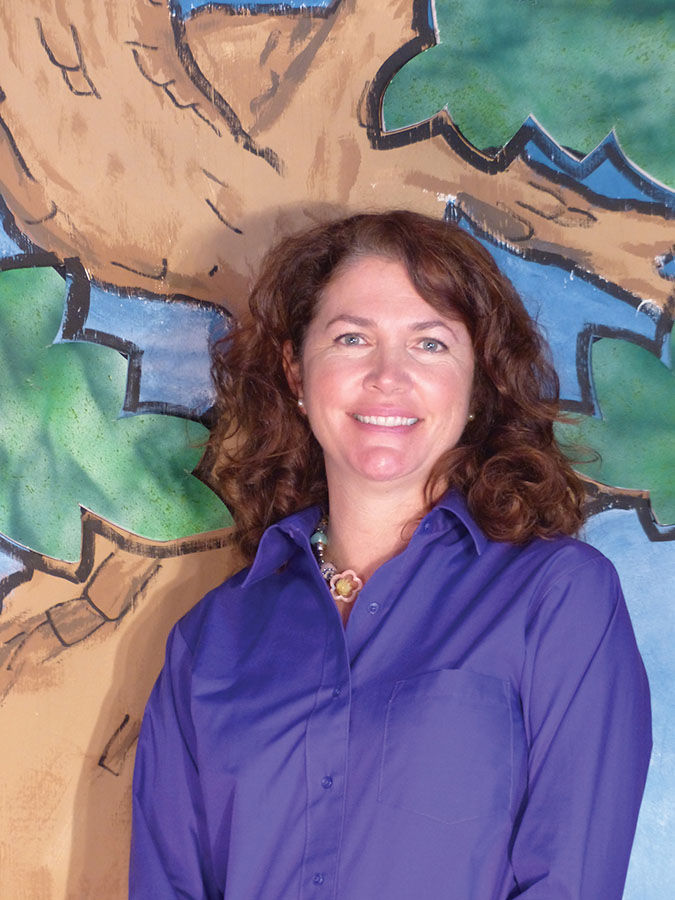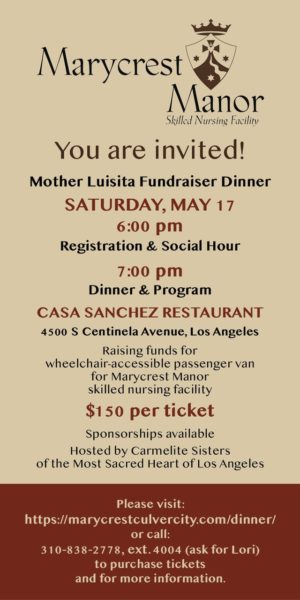“I was terrified of speaking in front of anybody. I grew up on a pig farm in Missouri, so I was always behind my mom’s skirt holding on. And then when I got older, I was still scared.”
Sarah Crenshaw’s words have a well-spoken, almost broadcast ring to them, along with the hint of her Midwestern upbringing. The sixth grade English teacher heads up the new drama program at Visitation School in Westchester. On a recent Wednesday morning, the 44-year-old educator is talking to a visitor in the cozy teachers’ lounge about the power of plays — how acting not only radically changed her own life, but how it’s doing the same for students at the little parochial two-story brick school in Westchester.
“When I was 14, I heard about a dinner theater on a river boat in the Missouri River near us,” she recalls. “And I said, ‘Dad, I think I really need this. I think I need to try out.’
“My dad’s a farmer. He didn’t have time in the summer to schlep me back and forth. But he said, ‘OK, I think you’re right.’ So he took me over. I auditioned. They gave me three different parts.
“You don’t know what you’ve got until you try,” she observes. “And sometimes the most terrified people, actors who are the most shy, are the most brilliant on camera or on stage. So it happened with me. And it was wonderful.”
Crenshaw went back to act in more plays on the Missouri, performing in “Meet Me in St. Louis” and many other summer stock favorites. Then she minored in theater at the University of Missouri, taking as many classes as she could on a journalism school scholarship. She went on to earn a law degree at the university, too.
Meanwhile, the multi-tasking young woman became a reporter and even weekend anchor at the local NBC affiliate, KOMU-TV in Columbia. She says, “Without a doubt,” the early acting fueled her broadcasting career.
She moved out to Los Angeles, took some acting classes, did a few commercials. She married and had a son, Vincil, who’s now a junior at Loyola High School. Lawyering jobs kept weaving in and out of her life. But they were never on her A-list on life accomplishments. “Honestly, I’m just not mean enough to be a good lawyer,” she says with a knowing chuckle. “I don’t like to sit around and think bad thoughts about people. It just doesn’t suit me. For now I’ve got too much energy.”
n‘We did Shakespeare’
Four years ago, Crenshaw found a creative outlet for all that get-up-and-go stamina. An opening came up at her daughter Clover’s Catholic school, Visitation, to teach grammar to junior high students. She’s also taught literature at Visitation and started a mock trial program and a library reading program. And in the fall of 2013, she kicked off the drama program with the daunting play “A Midsummer’s Night Dream.”
“The first year was a learning year to see how everything would occur,” she reports. “But what we found after all the bumps and bruises of a new program was that kids were totally transformed. I mean, five kids who graduated wanted to become actors. And we didn’t do an easy thing. We did Shakespeare.”
“And this year on Feb. 20th we’re doing ‘Alice in Wonderland,’ once again not easy stuff,” she notes. “And kids who are struggling academically even are mastering Victorian literature. It’s just incredible to see the transformation. It shows how important the theater arts experience is, and how it can be transformative in ways you just would never imagine.”
When the former student actress and TV news anchor is asked how this happens, she doesn’t hesitate.
“I think it’s two things,” she says. “The first one is the power of story. You know, we have a story to tell there. And we need everyone to come together to think about the story and how their character reveals the story, reveals the theme, helps it move it along. And we talk about it at rehearsal: ‘What is your character doing right now to progress the story? What are we trying to get the audience to feel?’
“And, you know, ‘Alice in Wonderland’ is a nightmare. So at the beginning, of course, we want everybody comfortable and happy. And then it becomes a nightmare. ‘So how does your character contribute to this weird dream? How can we let the audience know that they can have a nightmare and it’s OK? What is that story?’”
Crenshaw says drama’s other life-changing quality is more personal for her young actors, especially the neophytes. And it concerns an opportunity to be able to step outside their Facebook sharing, homework-driven, ‘I’ve-got-to-get-into-a-US-News-and-World-Report-rated-university’ peer pressure lives.
“You know,” she points out, “‘Mom expects for me to be perfect today; Dad wants me to be an athlete. All I have to do is be Cheshire Cat and be sweet. All I have to do right now is be Alice and curious, and also scared and wanting to go home. I can just push myself away for a minute and step outside of all that and all the stresses that go with being in sixth or seventh grade and wonderfully be someone else.’
“So most of all it’s a relief. They don’t have to be themselves right now: ‘It doesn’t matter that I am not perfect. It doesn’t matter that I can’t learn quickly. I get to be this for this moment, and it is perfect.’”
nLearning to be a rabbit
Ten days before opening night, Sandra Crenshaw and Dave Druse, the uncle of a Visitation student who’s building the six different sets for “Alice in Wonderland,” are working on the stage of Visitation’s auditorium. Below, four cast members sit around a folding table. All except one have been learning their lines and rehearsing the play since late last October.
Sixth-grader Brianna Rojas is playing Tweedledee; Erin Woolmore, also in sixth grade, both the big Alice and the White Queen. Eighth-graders Andres Fierro and Kevin Vintch hold down the parts of the White Rabbit and the King of Hearts, respectively.
Kevin, the fill-in member, has only been rehearsing for two weeks. He didn’t audition last fall because he really never imagined himself being in any play. Just the thought of speaking lines in front of people nearly left him shaking. But then Mrs. Crenshaw told him there was a cast crisis, and he was the right person to play the King of Hearts.
“I saw how hard they were working, and I saw all the fun that they’re having,” he says. “And once I saw that, I just really wanted to join it. I’m still trying to study my lines. But it’s not as big a challenge as you would think it is.”
Andres, a veteran of a couple musicals, is nodding. “I am the White Rabbit, so I have to twitch my nose, stomp my feet, hop around everywhere I go,” he explains. “So the hardest part would be learning to be a rabbit.” To study he Googled rabbits, watched them on YouTube and checked out “Alice in Wonderland” movies, especially the one starring Johnny Depp.
Erin admits the language was pretty hard and complicated. But she thinks she can handle it, even playing two parts. “I’ve been in a couple of plays before, in second grade and third grade,” she says.
All believe the table-readings of lines and rehearsals, recently twice a week, have changed them in unexpected ways. Andres used to do other things before getting down to homework. “Now I know you have to do homework first, get to the lines and then I can do whatever I want to,” he notes. “So my sense of responsibility has grown.”
Erin says the whole experience has made her more social. She’s gotten closer to other students she hardly talked to before. “In the past few years, I’ve been scared of getting up in front of people and doing big things,” she confides. “But since I auditioned, I’ve realize that it’s not that hard and nobody can, like, criticize you for doing anything. Because you’re just being yourself on stage, doing a play for entertainment.”
“I think it has changed me because I’ve learned, like Andres said, how to be more responsible,” points out Brianna. “And I’ve also been able to go in front of people and be myself. Because I used to be scared of what other people thought of me.”
With only two weeks in the cast, Kevin doesn’t know if he’s really changed. “But I can see it already growing,” he says. “Because I used to have stage fright, too. And now, going over and over and over stuff again, I feel more comfortable being on stage in front of people. Because before I always, like, would skip a bunch of my lines. I’d run over them. And now I don’t. I’m just more fluent.”
After a moment, he adds with a half-grin, “As the King, I get to act really annoying and crazy. Yeah, it’s fun to act crazy, and I get to be myself on stage.”
n‘Indelible mark’
But will these adolescent advancements in self-confidence, along with being more social and responsible, last into high school and beyond?
Sarah Crenshaw has no doubt.
“Oh, most definitely,” she says. “It’s an indelible mark. It’s there forever, you know. It just is. And for me, personally, it was. You can see it. There’s no taking it back. It’s an experience they’ll be able to recall as a positive experience as opposed to getting in trouble,” and she laughs, “or not getting an A on a test: ‘This was a great experience that I had.’
“You just can’t erase it.”

